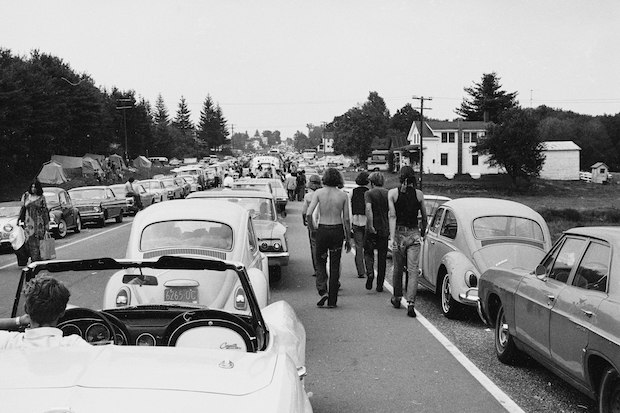In 1963, when the bloom was still on the rose, Bob Dylan described Woodstock as a place where ‘we stop the clouds, turn time back and inside out, make the sun turn on and off… the greatest place’. Six years later, he wrote in Chronicles: Volume One, ‘Woodstock had turned into a nightmare, a place of chaos.’
Barney Hoskyns, who lived there in the 1990s, marshals plenty of evidence to support both assessments. This Catskills hamlet has been at various times a blue-collar small town, a bohemian enclave, a tourist trap, a hotbed of creativity, a cauldron of hedonism, a madhouse and ‘a counter-cultural touchstone’. In its heyday it attracted such luminaries as Janis Joplin, Van Morrison, Todd Rundgren, George Harrison and The Band. Such was its reputation that the promoters of the 1969 festival appropriated its name even though their Aquarian pageant took place 60 miles away.
But this engaging book’s anti-hero isn’t a musician. It’s Albert Grossman, manager of Dylan and Joplin, ‘hippie baron of Woodstock’, and one of the record business’s great visionary bullies. ‘Integrity bothered Albert,’ wrote the folksinger Dave Van Ronk. ‘He used to say there was no such thing as an honest man.’ Grossman was both the serpent in Eden and the man who, for better or worse, made Woodstock what it was.
There was already something alluring about the place. In the early 20th century, it was home to Ralph Whitehead’s Ruskin-inspired Byrdcliffe arts colony and its more radical offshoot, Maverick, whose inaugural 1915 festival was touted as ‘a village that will stand for but a day’. The place the local newspaper called ‘the most cosmopolitan village in the world’ was primarily popular with painters and craftsmen until Grossman moved there in 1963 and turned it into a rural outpost of the music industry.
His star client soon followed. It’s a familiar story but deftly told: Woodstock was where Dylan took shelter from his newfound celebrity and wrote many of his best songs, including ‘Like a Rolling Stone’. When he finally soured on both town and manager, the baton passed to his former backing musicians, The Band. Their 1968 debut album Music from Big Pink — rock’n’roll rerouted via the 19th century — defined ‘the Woodstock sound’ that became known as Americana: rootsy, downhome music nurtured in the ‘peaceful country places’ celebrated in Byrdcliffe’s 1903 manifesto.
It was the perfect soundtrack, Hoskyns notes, for the era of the Whole Earth Catalog and The Greening of America, when hippies fled the cities with dreams of establishing rural utopias. The journalist Al Aronowitz hymned the Woodstock scene’s commitment to ‘the hunger for earth-grown wisdom and a redefined morality… the thirst for simple touchstones and the natural law of trees’. So far, so idyllic, but you can guess what’s coming next.
Hotel California, Hoskyns’s 2006 account of the LA canyon scene, demonstrated that he was both an earnest music fan and an enthusiastic gossip — a winning combination. Woodstock provides an even more compact stage for a similar drama of back-to-basics idealism poisoned by ruthless ambition, financial chicanery, sexual infidelity, hard drugs and musician’s inhumanity to musician. Perhaps all music scenes tell the same story. It wasn’t just the aftermath of the festival that led a reporter in 1972 to declare: ‘The Woodstock pop-music boom is imploding, eating into itself, trying to stave off the entropy at its core.’
Take The Band. Their music may have been a reactionary disavowal of 1960s revolutionary energies, privileging instead the age-old bonds of family and heritage (singer-songwriter Richard Thompson called it ‘kind of counter-counterculture’), but the various members’ egos and excesses rivalled those of any big-city band. Todd Rundgren, one of Hoskyns’s dozens of interviewees, remembers engineering their 1970 album Stage Fright and noting the irony of creating a sound that was ‘concertedly folksy and creaky and dusty and not slick’ while the musicians dined on lobster thermidor. Booze, heroin and cocaine abounded; friendships frayed. So much for the natural law of trees. Walled in by wealth and a court of sycophants, Grossman embodied the distance between the bucolic ideal and the tainted reality.
Hoskyns’s obvious fondness for Woodstock and the musicians who lived there lifts the narrative — he writes movingly about broken souls like Karen Dalton and Tim Hardin as well as the big names — but it has a fundamentally tragic arc: paradise lost. I finished it waist-deep in bitterness, heartache, artistic decline and death, and immediately felt compelled to return to the photograph of Dylan in the summer of 1964, pecking at his typewriter in the room above the Café Espresso, relaxed and happy, before the fall.






Comments